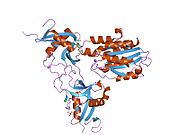Integrin Alpha 2
Appearance
(Redirected fromCD49b)
Integrin Alpha -2,orCD49b(cluster of differentiation 49b), is aproteinwhich in humans is encoded by theCD49bgene.
The CD49b protein is anintegrinAlpha subunit. It makes up half of the α2β1 integrin duplex. Integrins are heterodimeric integral membraneglycoproteinscomposed of a distinct Alpha chain and a common beta chain. They are found on a wide variety of cell types includingT cells(theNKT cells),NK cells,fibroblastsandplatelets.Integrins are involved incell adhesionand also participate in cell-surface-mediated signalling.[5]
Expression of CD49b in conjunction withLAG-3has been used to identifytype 1 regulatory (Tr1) cells.[6]
The DX5monoclonal antibodyrecognizes mouse CD49b.[7]
Interactions
[edit]CD49b has been shown tointeractwithMMP1.[8][9]
References
[edit]- ^abcGRCh38: Ensembl release 89: ENSG00000164171–Ensembl,May 2017
- ^abcGRCm38: Ensembl release 89: ENSMUSG00000015533–Ensembl,May 2017
- ^"Human PubMed Reference:".National Center for Biotechnology Information, U.S. National Library of Medicine.
- ^"Mouse PubMed Reference:".National Center for Biotechnology Information, U.S. National Library of Medicine.
- ^"Entrez Gene: ITGA2 integrin, Alpha 2 (CD49B, Alpha 2 subunit of VLA-2 receptor)".
- ^Gagliani N, Magnani CF, Huber S, Gianolini ME, Pala M, Licona-Limon P, Guo B, Herbert DR, Bulfone A (2013-06-01). "Coexpression of CD49b and LAG-3 identifies human and mouse T regulatory type 1 cells".Nature Medicine.19(6): 739–746.doi:10.1038/nm.3179.ISSN1546-170X.PMID23624599.S2CID21305032.
- ^Arase H, Saito T, Phillips JH, Lanier LL (August 2001)."Cutting edge: the mouse NK cell-associated antigen recognized by DX5 monoclonal antibody is CD49b ( Alpha 2 integrin, very late antigen-2)".Journal of Immunology.167(3): 1141–4.doi:10.4049/jimmunol.167.3.1141.PMID11466327.
- ^Stricker TP, Dumin JA, Dickeson SK, Chung L, Nagase H, Parks WC, Santoro SA (Aug 2001)."Structural analysis of the Alpha (2) integrin I domain/procollagenase-1 (matrix metalloproteinase-1) interaction".J. Biol. Chem.276(31): 29375–81.doi:10.1074/jbc.M102217200.PMID11359774.
- ^Dumin JA, Dickeson SK, Stricker TP, Bhattacharyya-Pakrasi M, Roby JD, Santoro SA, Parks WC (Aug 2001)."Pro-collagenase-1 (matrix metalloproteinase-1) binds the Alpha (2)beta(1) integrin upon release from keratinocytes migrating on type I collagen".J. Biol. Chem.276(31): 29368–74.doi:10.1074/jbc.M104179200.PMID11359786.
External links
[edit]- CD49b+antigenat the U.S. National Library of MedicineMedical Subject Headings(MeSH)
- PDBe-KBprovides an overview of all the structure information available in the PDB for Human Integrin Alpha 2
Further reading
[edit]- Moroi M, Jung SM (1997). "Platelet receptors for collagen".Thromb. Haemost.78(1): 439–44.doi:10.1055/s-0038-1657566.PMID9198193.S2CID8121197.
- Takada Y, Kamata T, Irie A, Puzon-McLaughlin W, Zhang XP (1998). "Structural basis of integrin-mediated signal transduction".Matrix Biol.16(4): 143–51.doi:10.1016/S0945-053X(97)90002-0.PMID9402003.
- Dickeson SK, Santoro SA (1998)."Ligand recognition by the I domain-containing integrins".Cell. Mol. Life Sci.54(6): 556–66.doi:10.1007/s000180050184.PMC11147323.PMID9676575.S2CID9775686.
- Porter JC, Hogg N (1999). "Integrins take partners: cross-talk between integrins and other membrane receptors".Trends Cell Biol.8(10): 390–6.doi:10.1016/S0962-8924(98)01344-0.PMID9789327.
- Plenz GA, Deng MC, Robenek H, Völker W (2003). "Vascular collagens: spotlight on the role of type VIII collagen in atherogenesis".Atherosclerosis.166(1): 1–11.doi:10.1016/S0021-9150(01)00766-3.PMID12482545.
- Charakida M, Tousoulis D, Stefanadis C, Toutouzas P (2003). "The impact of platelet glycoprotein IIIa and Ia polymorphisms in cardiovascular thrombotic disease".Italian Heart Journal.4(1): 17–22.PMID12690916.
- Tsantes AE, Nikolopoulos GK, Bagos PG, Vaiopoulos G, Travlou A (2007). "Lack of association between the platelet glycoprotein Ia C807T gene polymorphism and coronary artery disease: a meta-analysis".Int. J. Cardiol.118(2): 189–96.doi:10.1016/j.ijcard.2006.06.047.PMID17023078.
External links
[edit]- ITGA2Info with links in theCell Migration GatewayArchived2014-12-11 at theWayback Machine
- HumanITGA2genome location andITGA2gene details page in theUCSC Genome Browser.








